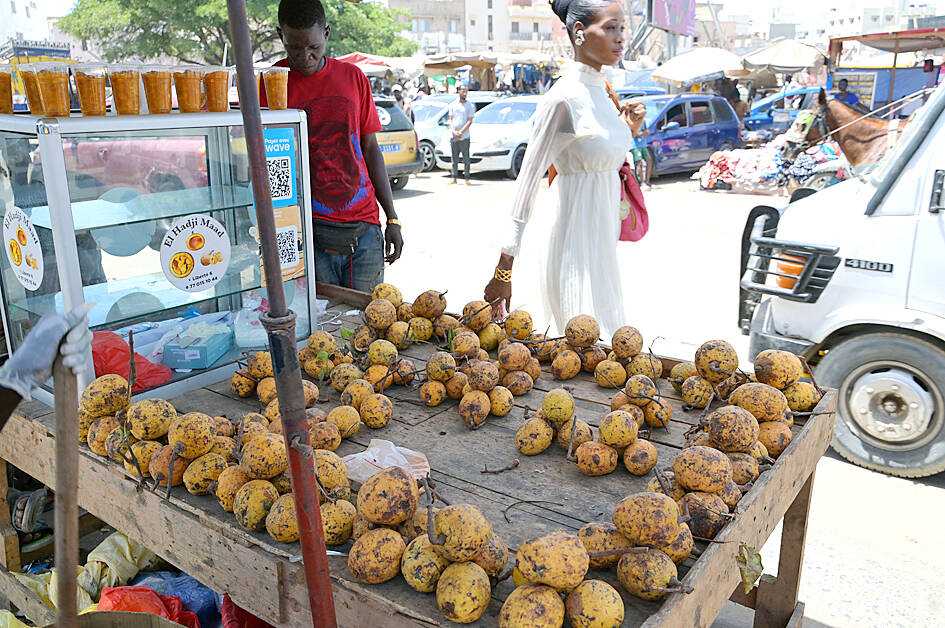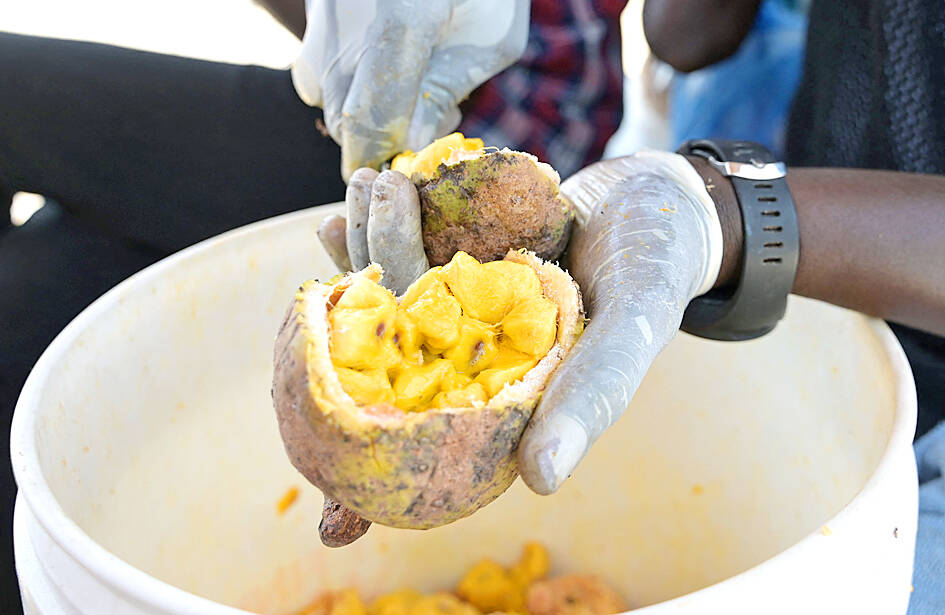Outside a bustling fruit market in Senegal’s Dakar region, three trucks blocked the road while a dozen men sweated to unload a precious cargo.
Working in intense heat and racing against the clock, they were shifting 60 tonnes of maad — a delicate tropical fruit that is massively popular in the West African state.
A yellow fruit with a pulp that has a distinctive sweet and sour flavor and is rich in vitamins and fiber, maad comes from a vine called Saba senegalensis, which grows wild and is common across the region.

Photo: AFP
The fruit’s season is relatively short, running from May to August, which prompts a rush of sellers at street corners, hawking the delicacy with salt, sugar or chilli, blended into juice or turned into jam.
Maad has different names across West Africa, where it is eaten from the Ivory Coast to Mali and Guinea — but it is most popular in Senegal.
Countless jobs depend on the fruit, from harvesting and distribution to selling and processing.

Photo: AFP
At the Sandika market in Pikine, workers labored to empty the trucks that had just arrived, sorting the maad according to ripeness.
“The unloading will be finished by the end of the day,” said Dame Sarr, a 28-year-old wholesaler, who with his uncle had invested 6 million CFA francs (US$10.020) in the consignment.
They expected to clear the equivalent of at least US$1,000 in profit — if the fruit was sold fast.
“If I don’t shift the goods, I will have to cut the price tomorrow, because with every passing day maad loses its quality,” he said, sitting under a parasol.
The good news was that several customers were already hovering around.
Sarr had separated out the finest fruit to sell for 4,200 CFA francs for a bucket of 40 pieces. The others were on sale for half that price. A 20kg box of maad cost between 20,000 CFA francs and 25,000 CFA francs.
“Maad is a very risky investment. It can’t stand sunlight or rain, and transporting it is difficult,” market representative and salesman Djiby Sandika said.
The fruit “best suits small-scale retailers, who make large profits,” Sarr said.
In Senegal most maad grows in the southern Casamance region on vines that wrap themselves around trees in thickly forested areas.
Picking the fruit is done by hand and involves using long sticks — a task that involves the added risk of snakes.
The Economy, Territory, Development and Service (ETDS) non-governmental organization said that nearly 1,500 tonnes of maad are harvested annually in the Ziguinchor, Kedougou and Kolda areas.
Mariama Dieme, who heads a project to market maad production in Casamance, said that with better access, output could be trebled.
The fruit is already under threat from “over-exploitation,” from fires used to burn stubble from fields and from damage caused by forest hunters, Dieme said.
The ETDS is fostering a program for small-scale woman-led producers to make maad jam, juice or syrup, and even export some of their production.
Maad jam sold in France via sellers on Instagram costs 25 euros (US$27.38) for a 300g jar, said Fatou Binetou Adour, a Senegalese who lives in Paris.

DENIAL: Pyongyang said a South Korean drone filmed unspecified areas in a North Korean border town, but Seoul said it did not operate drones on the dates it cited North Korea’s military accused South Korea of flying drones across the border between the nations this week, yesterday warning that the South would face consequences for its “unpardonable hysteria.” Seoul quickly denied the accusation, but the development is likely to further dim prospects for its efforts to restore ties with Pyongyang. North Korean forces used special electronic warfare assets on Sunday to bring down a South Korean drone flying over North Korea’s border town. The drone was equipped with two cameras that filmed unspecified areas, the General Staff of the North Korean People’s Army said in a statement. South Korea infiltrated another drone

COMMUNIST ALIGNMENT: To Lam wants to combine party chief and state presidency roles, with the decision resting on the election of 200 new party delegates next week Communist Party of Vietnam General Secretary To Lam is seeking to combine his party role with the state presidency, officials said, in a move that would align Vietnam’s political structure more closely to China’s, where President Xi Jinping (習近平) heads the party and state. Next week about 1,600 delegates are to gather in Hanoi to commence a week-long communist party congress, held every five years to select new leaders and set policy goals for the single-party state. Lam, 68, bade for both top positions at a party meeting last month, seeking initial party approval ahead of the congress, three people briefed by

Indonesia and Malaysia have become the first countries to block Grok, the artificial intelligence (AI) chatbot developed by Elon Musk’s xAI, after authorities said it was being misused to generate sexually explicit and nonconsensual images. The moves reflect growing global concern over generative AI tools that can produce realistic images, sound and text, while existing safeguards fail to prevent their abuse. The Grok chatbot, which is accessed through Musk’s social media platform X, has been criticized for generating manipulated images, including depictions of women in bikinis or sexually explicit poses, as well as images involving children. Regulators in the two Southeast Asian

ICE DISPUTE: The Trump administration has sought to paint Good as a ‘domestic terrorist,’ insisting that the agent who fatally shot her was acting in self-defense Thousands of demonstrators chanting the name of the woman killed by a US federal agent in Minneapolis, Minnesota, took to the city’s streets on Saturday, amid widespread anger at use of force in the immigration crackdown of US President Donald Trump. Organizers said more than 1,000 events were planned across the US under the slogan “ICE, Out for Good” — referring to the US Immigration and Customs Enforcement, which is drawing growing opposition over its execution of Trump’s effort at mass deportations. The slogan is also a reference to Renee Good, the 37-year-old mother shot dead on Wednesday in her